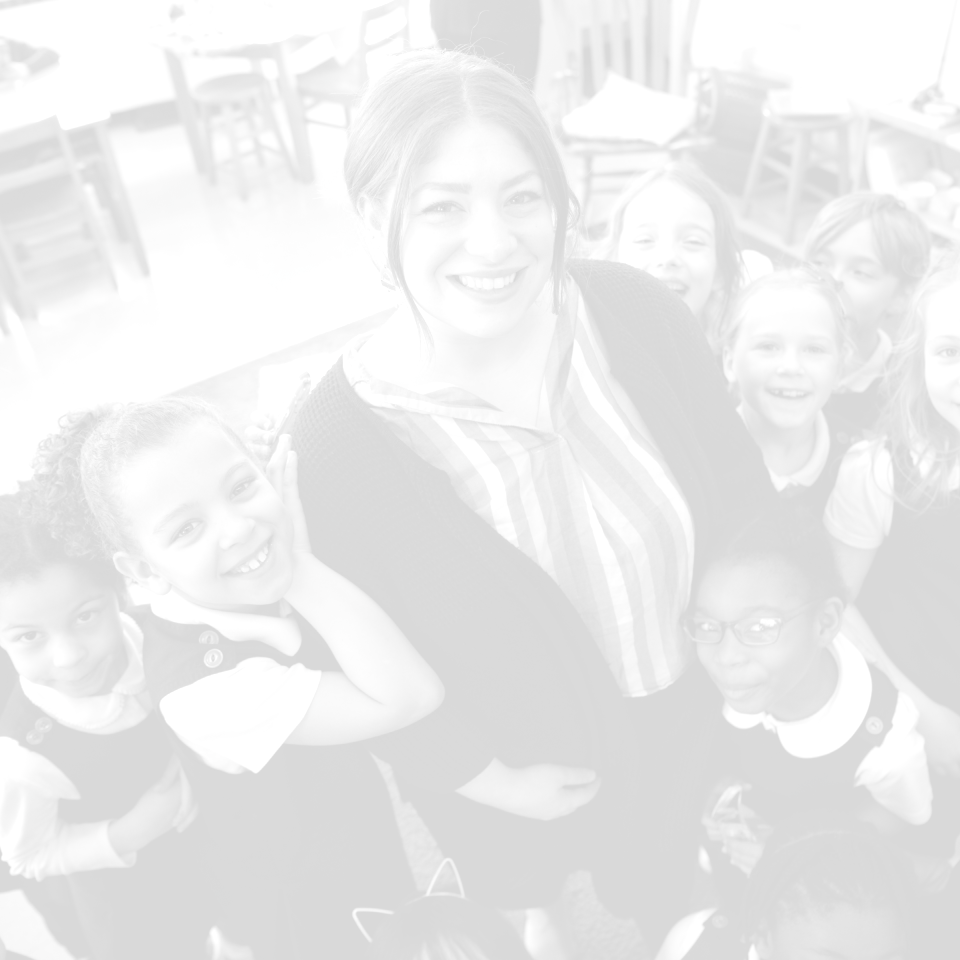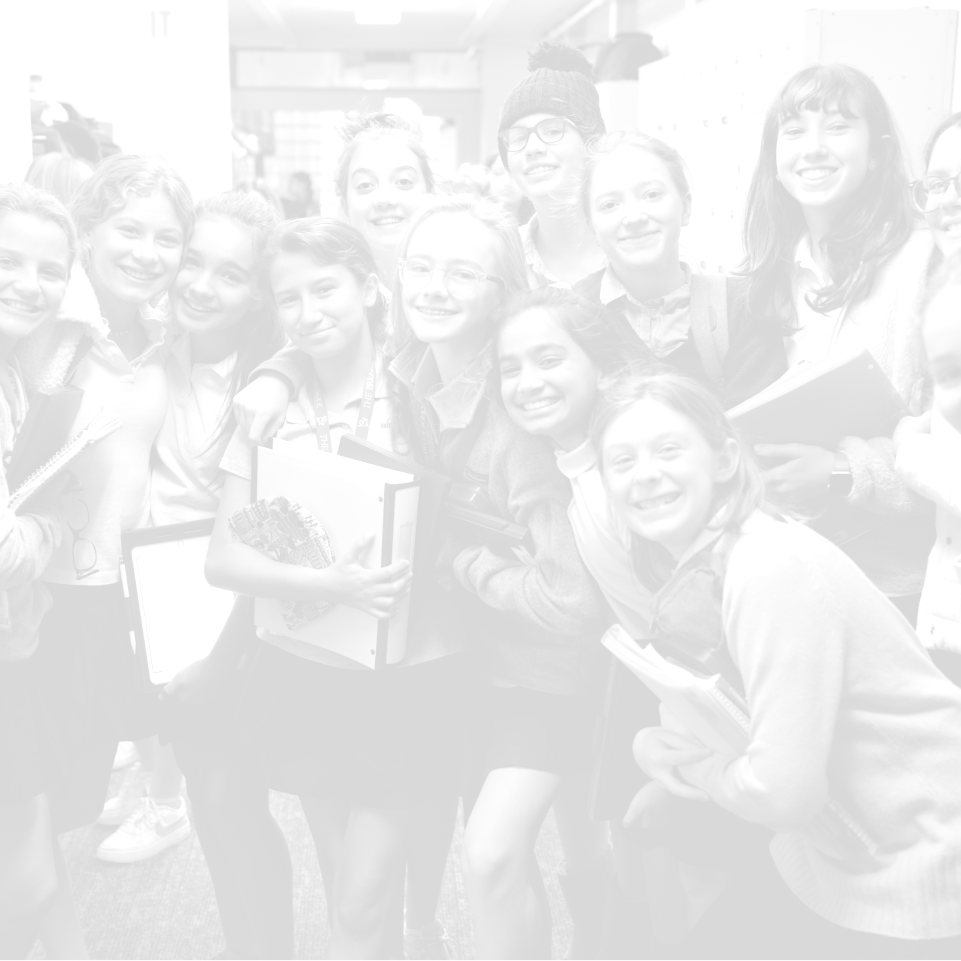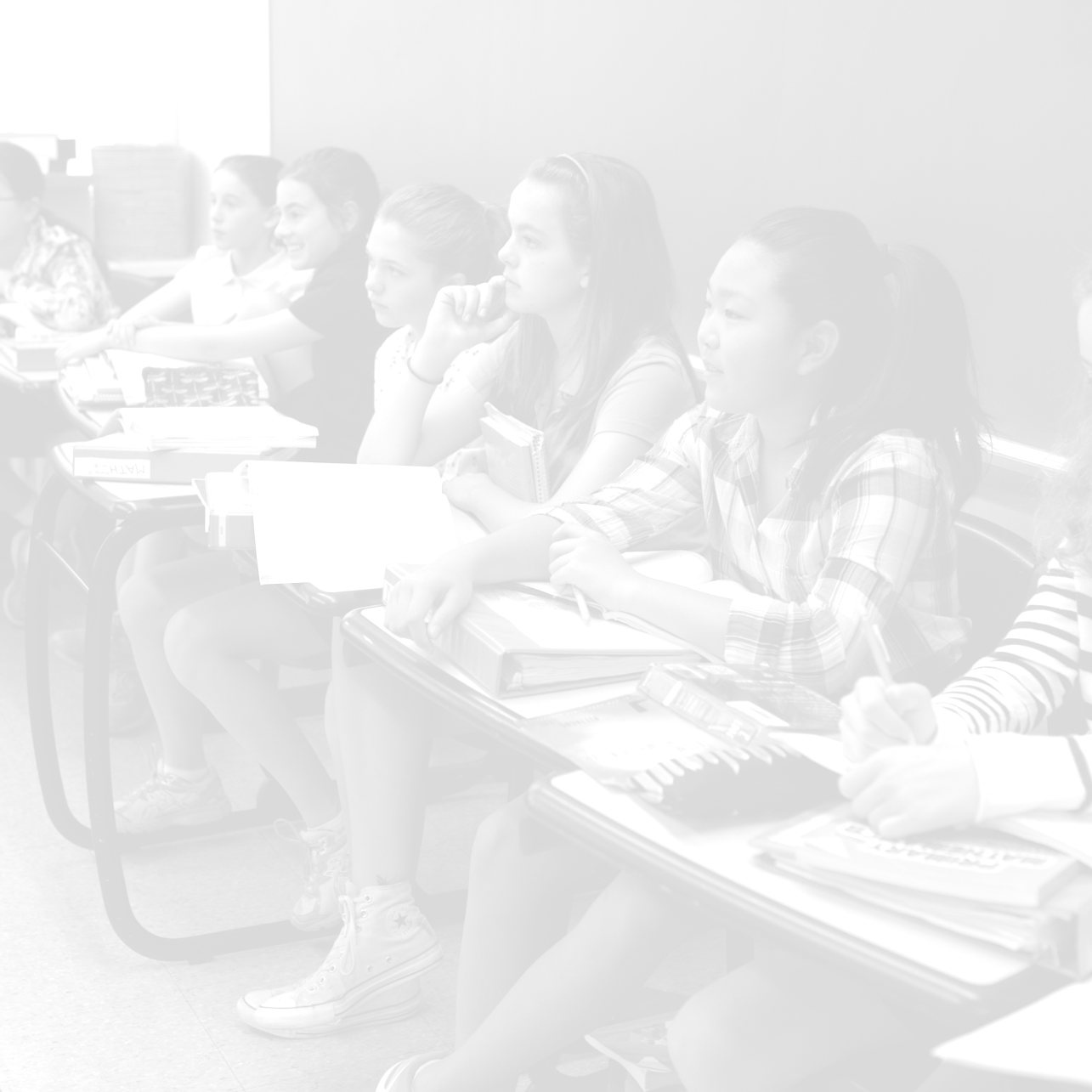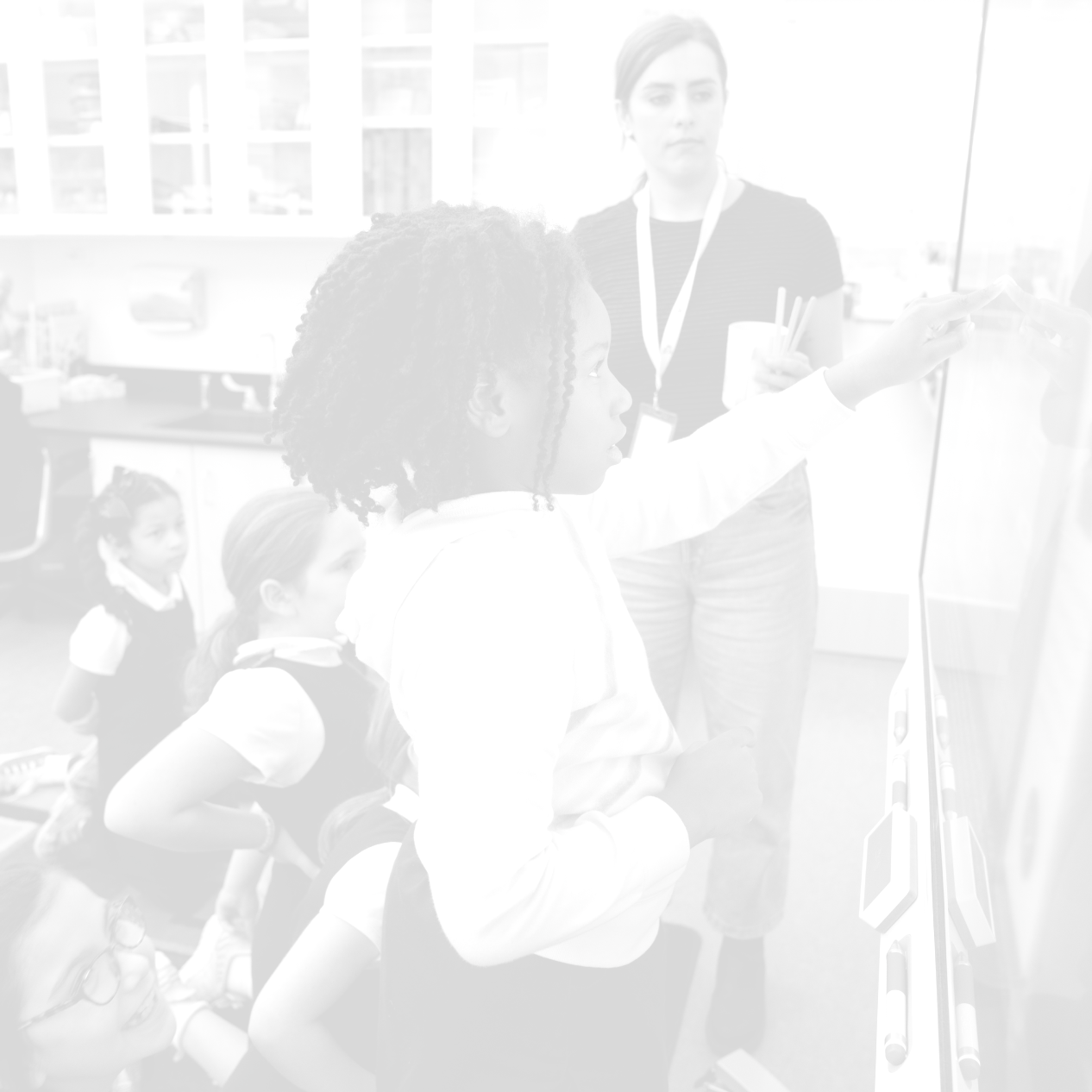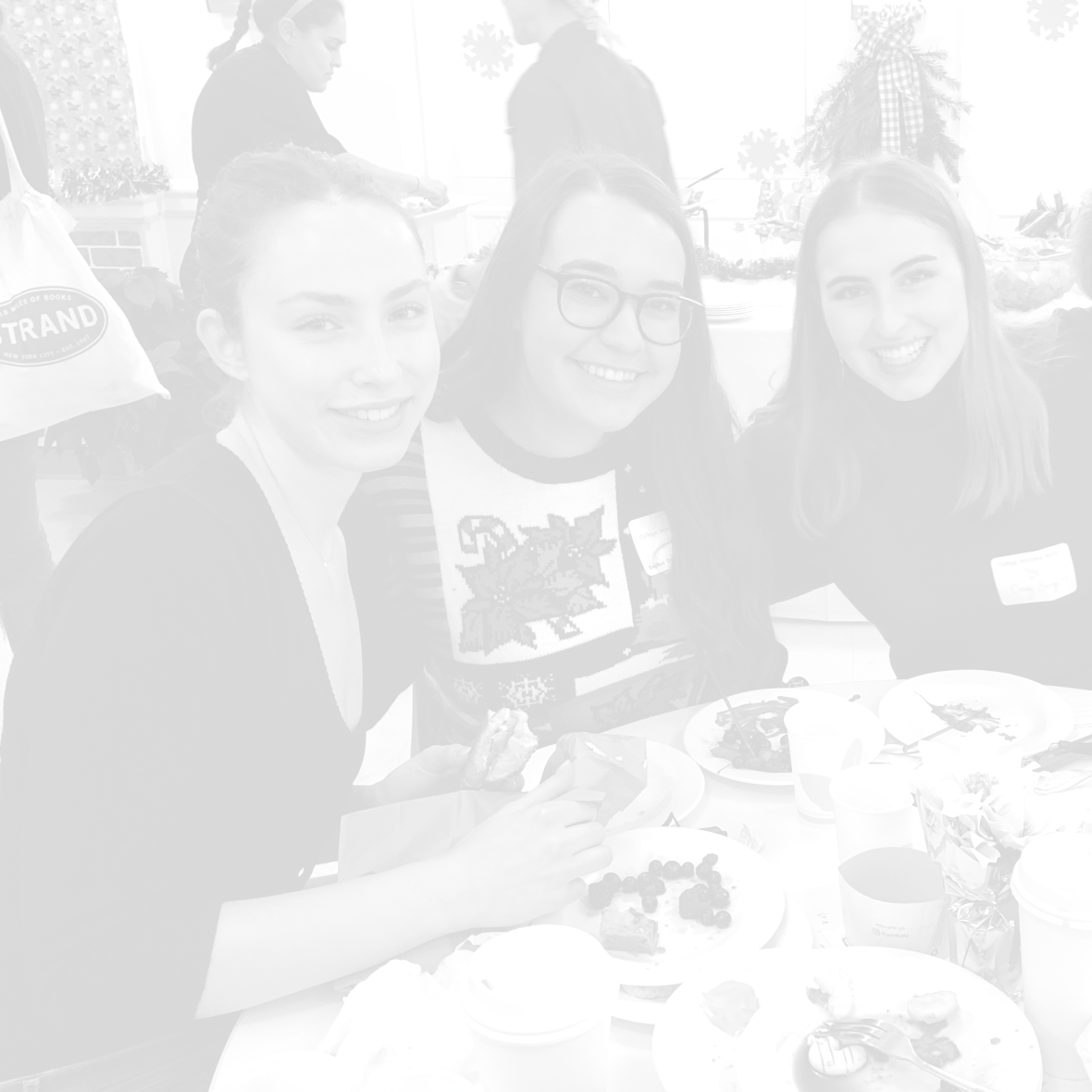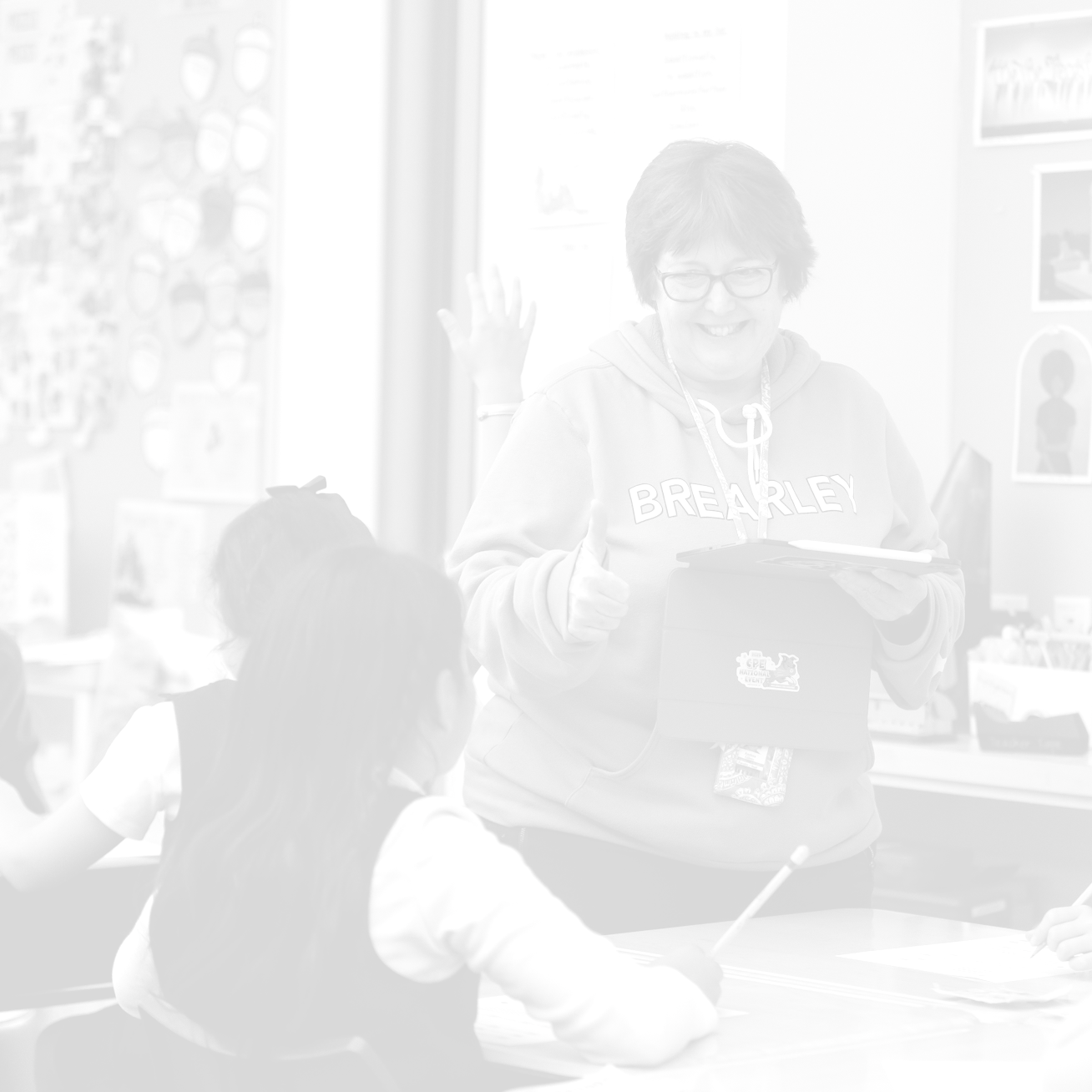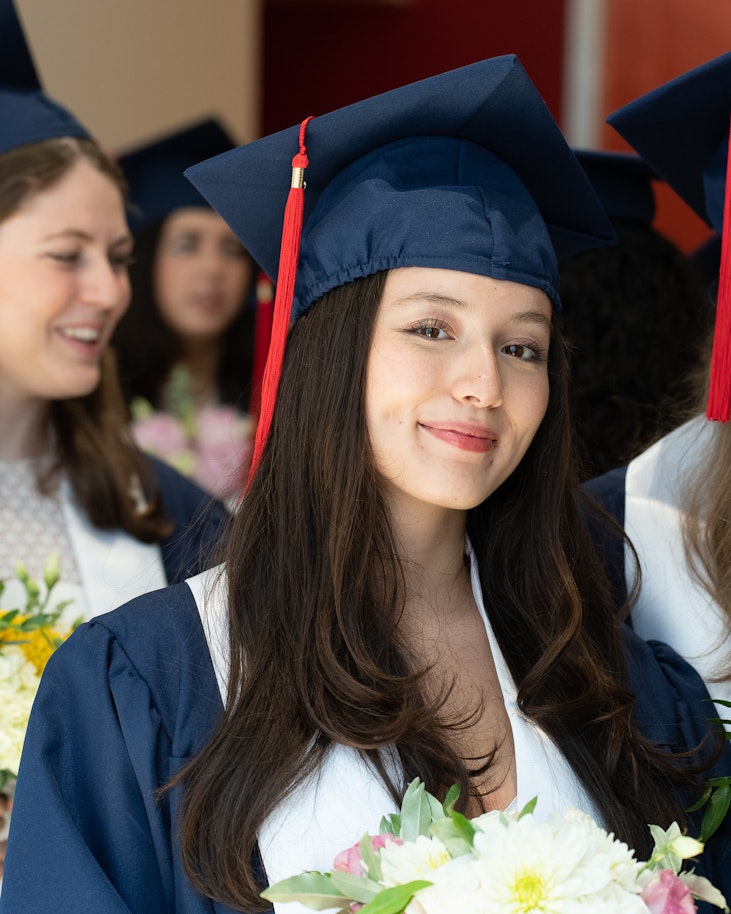
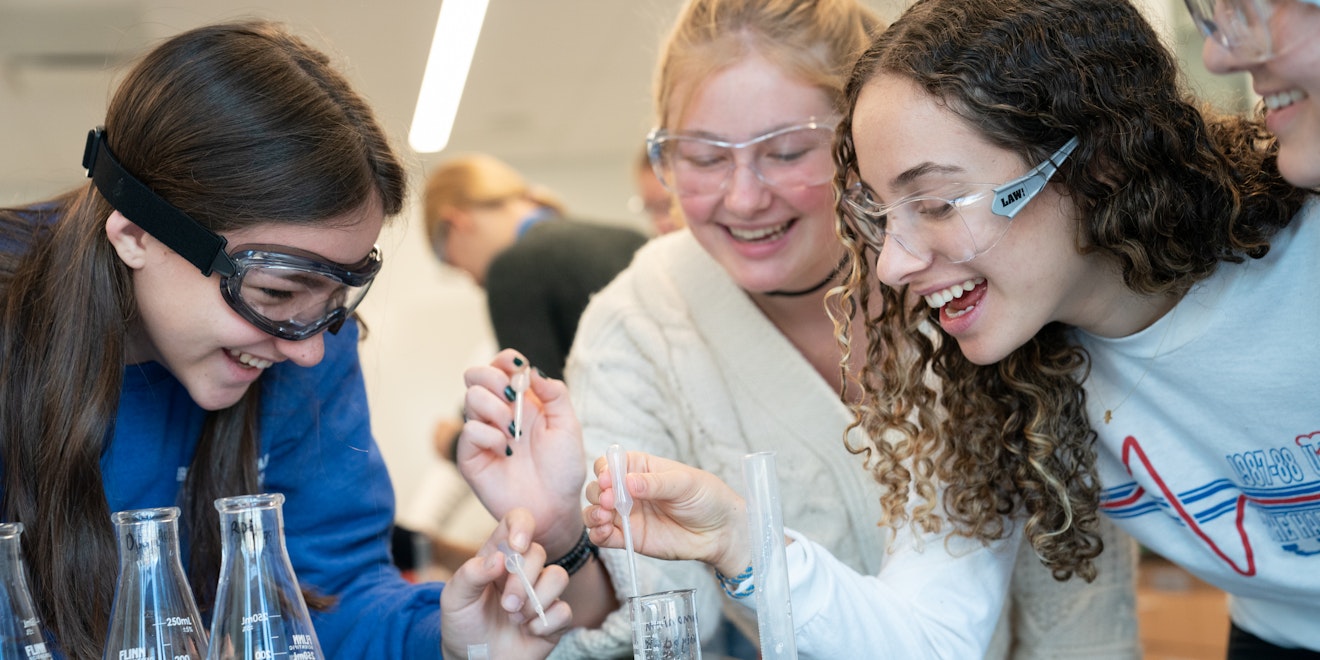
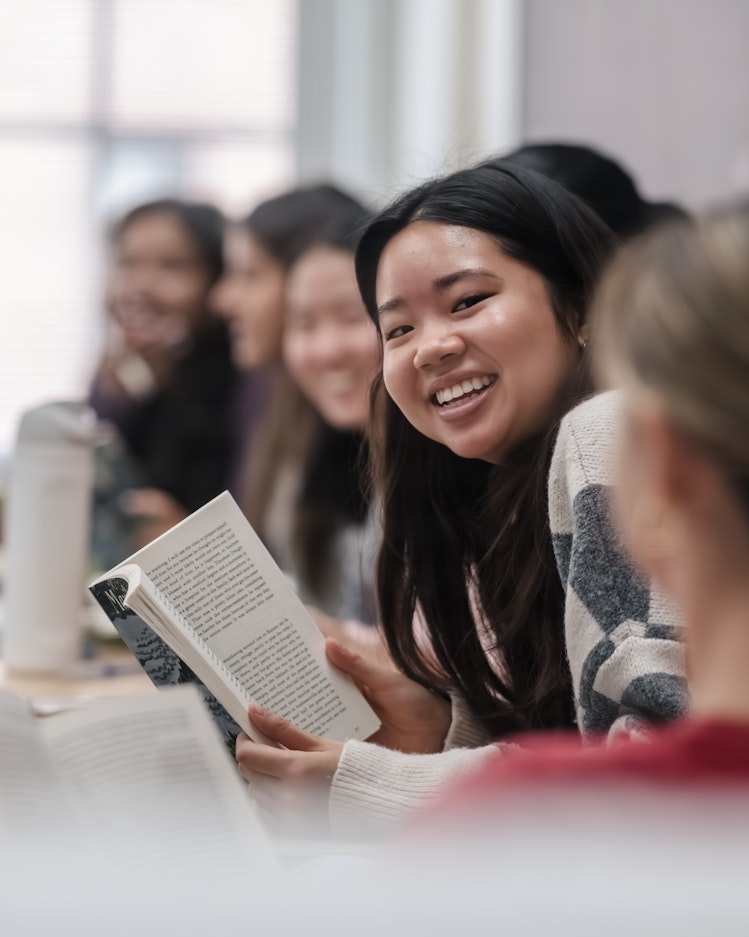
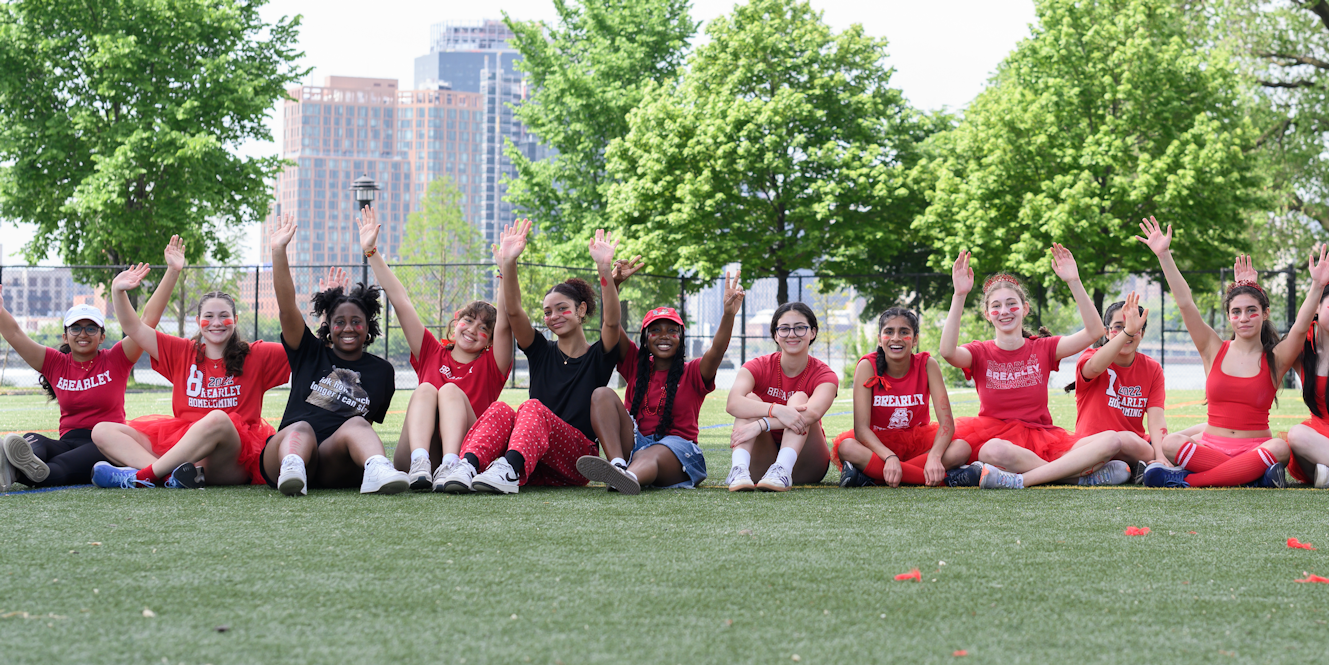
Upper School
Entrance into the Upper School marks a significant transition in the life of a Brearley Student. With greater opportunities to explore her academic, athletic, and artistic interests, the Upper School provides students with a foundation for developing essential life skills. Guided by dedicated faculty and staff, Upper School students develop a strong sense of themselves and confidence in their abilities. This ultimately creates resourceful young women who are prepared to make a difference in the world outside Brearley.
Brearley's mission asks us to cultivate a commitment to the greater good. We believe that leadership and service go hand in hand. Upper School students are encouraged to fully participate in building an active and inclusive community that works together to address the complex issues facing our world today.
Guided by dedicated faculty and staff, Upper School students develop a strong sense of themselves and confidence in their abilities.
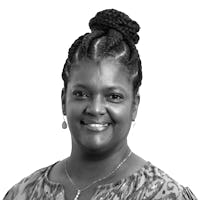
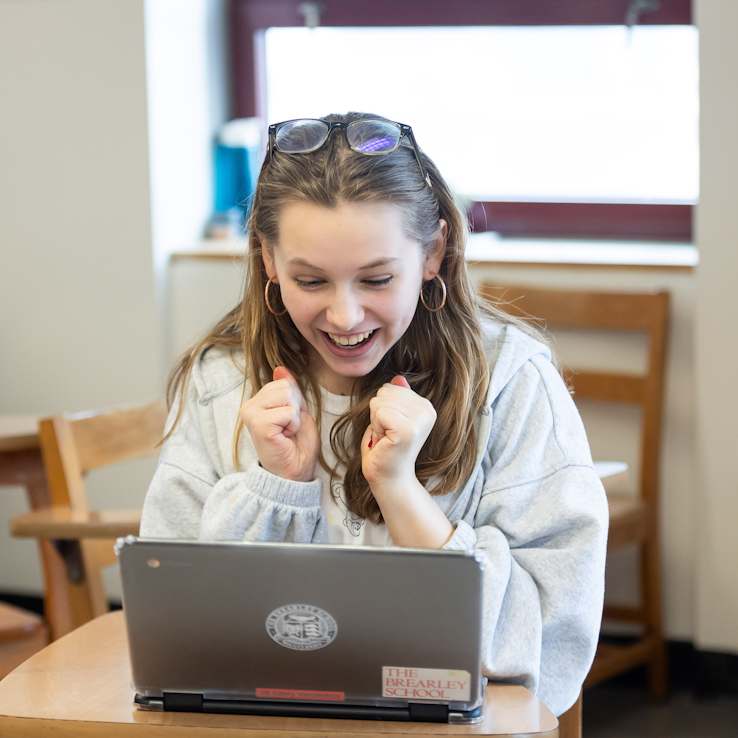
Joy in Learning
Whether academic or extracurricular, our students do not shy away from challenges; rather they love to grapple with and overcome them. Class schedules are customized and tailored each year to meet individual needs, helping students balance curricular and co-curricular demands. Students also have greater choices in their coursework each year. This culminates in Senior Spring when each student immerses herself in a curriculum of her own making. For example, students can take minicourses, participate in internships or volunteer with an organization whose mission resonates with her. These projects capture the intellectual vibrancy that runs through the school.
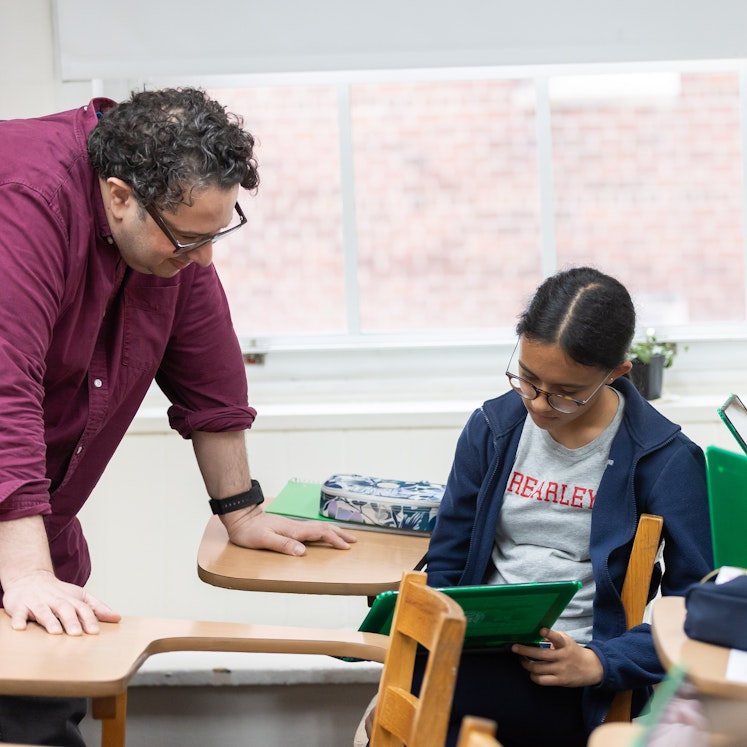
Faculty Mentors
and Advisors
Our Upper School students benefit from a cadre of dedicated faculty who guide them to stretch themselves intellectually, emotionally and socially. Highly accomplished in their fields, they are attuned to each student’s aspirations and pace of development, her personality and talents. By asking much, and by serving as role models, our teachers inspire students to push beyond their perceived limits. They are an integral part of the Brearley experience and help shape our students into independent, confident women who are committed to the greater good.
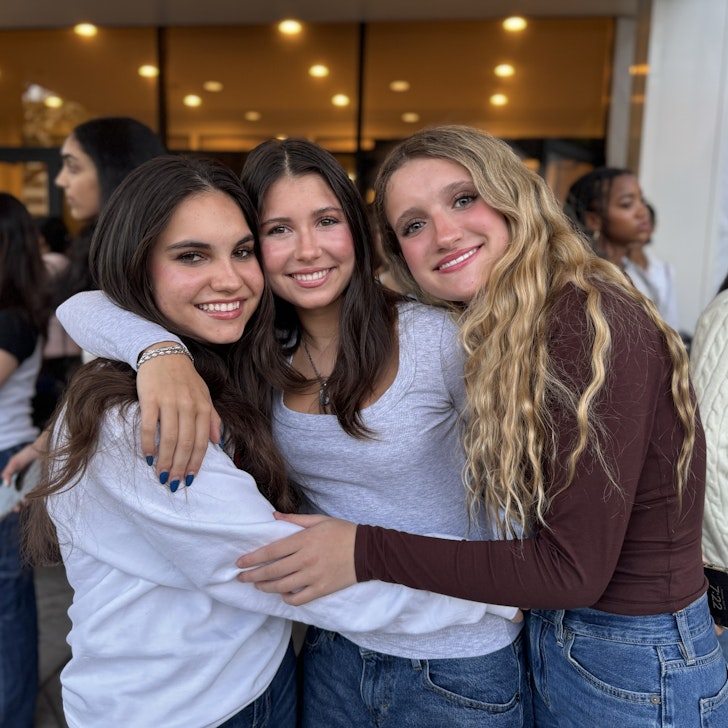
No One
Brearley Girl
Brearley students are multidimensional; we like to say there is no ONE Brearley girl. Upper School students are involved in a myriad of activities, both in and outside of the classroom, that allow them to pursue their passions. Everyone can find something they love to do at Brearley. Are you a soccer player who loves the cello and writes for the literary magazine? Are you a thespian who is passionate about the environment and loves robotics? Are you a budding scientist who works in a research lab but also plays chess and enjoys ceramics? Unsure where your interests lie but are curious and want to explore your opportunities? Then you belong here.
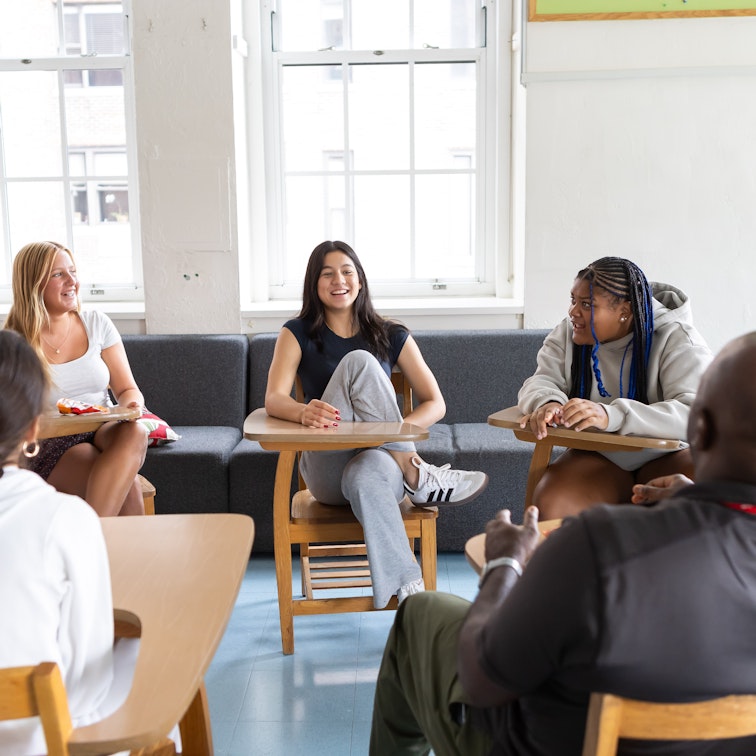
Belonging and Building a Respectful Community
Our students have multiple opportunities to develop their individual voices, learn how to have difficult yet respectful conversations and assume responsibility for themselves and for others. They learn how to lead and how to encourage others to succeed. Through student-run affinity groups, clubs and self-government, they develop a true sense of belonging, knowing they are valued and celebrated for who they are. Belonging is more than a buzzword here; it is an inherent part of who we are as a school.
Class IX Curriculum
English
Personal essays by writers such as Julia Alvarez, Amy Tan, Richard Rodriguez, Robin Wall Kimmerer, Diana Abu-Jaber and Chimamanda Ngozi Adichie; grammar; sonnets by writers such as William Shakespeare, William Wordsworth, Edna St.Vincent Millay, Claude McKay and Rhina Espaillat; Romeo and Juliet, Pride and Prejudice, Their Eyes Were Watching God; practice in close reading and analytical writing; creative assignments.
Twentieth-Century World History
Survey of global history from c. 1880 to the present. Beginning with the interlinked phenomena of nationalism, New Imperialism, and the Second Industrial Revolution, it traces the history of the World Wars and the Great Depression, ideologies such as communism, fascism, and anti-colonialism, the emergence of scores of new nation-states, for example, the state of Israel, and the beginning and end of the Cold War. The course emphasizes close reading of primary sources and prepares students to understand the deep background of contemporary world affairs. In most years, Class IX visits the United States Holocaust Memorial Museum in Washington, DC.
Latin
Completion of the introduction to basic vocabulary and syntax using the Suburani series, followed by stories from the Fabulae Faciles collection and excerpts from adapted and unadapted Roman authors.
Drama
Introduction to physical comedy and character creation through the study of improvisation, open scene work, farce, and commedia dell’arte. The course culminates in the performance of short comedic plays in the late spring, and through the production process, students engage with various aspects of technical theater.
Studio Art
Composition, collage, and fundamentals of oil painting are taught through direct observation and imaginative invention of still life. Participation in conceptual and art-historical discussions, group critique, and one self-guided museum study assignment is required. (half credit; throughout the year)
Health
Throughout the Upper School, the five core competencies of social and emotional intelligence are integrated into a solid health education. Curriculum covers mindfulness, values clarification, relationships, human sexuality, media literacy, and drug and alcohol education. Classes are designed to promote small group discussion and culminate in a project in which students design public service announcements on topics of their choice.
Mathematics
Class IX students study geometry. Two different tracks are offered and placement is determined with the help of the math faculty.
Class IX Math Section DescriptionsBiology
Study of life processes, with emphasis on cell biology, biochemistry, DNA, biotechnology, genetics, evolution, and animal physiology. Students learn about data analysis through projects on plant development and genetics. The course culminates with a research project on the physiology of a human disease.
Modern Languages
Students continue with their study of modern languages, either French, Spanish or Mandarin.
Class IX Modern Language Course DescriptionsMusic
Although music is no longer a required course in Upper School, Class IX students have the opportunity to delve into different courses including vocal work, orchestra or instrumental techniques. (half credit; throughout the year)
Class IX Music Course DescriptionsPhysical Education
Throughout the Upper School, offerings vary by trimester, including courses on fitness, dance, sports, martial arts, special programming, and mindfulness; emphasis on lifelong fitness and exercise. Students are required to complete one semester of Health in Class IX and to become certified in First Aid/CPR before graduation. This course, offered to Classes XI and XII, follows the American Heart Association training course for first responders.
Co-Curricular Activities
Students have many opportunities to pursue their interests beyond the curriculum. The School offers arts activities—photography, sculpture, ceramics, dramatic productions, orchestra and chorus, for example—in addition to the regular courses, as well as writing and publishing opportunities. Students in the Upper School may be admitted to Brearley’s Advanced Science Research Seminar or Poetry Workshop; they may also participate in clubs that focus on model government, robotics, debate and many other topics; they may join Interschool advanced math courses as juniors or seniors.
Class IX Co-Curricular ActivitiesClass X Curriculum
English
American literature, novels, novellas, essays, autobiographies and poems from the Puritans through the moderns. Authors include James Baldwin, Anne Bradstreet, Willa Cather, W. E. B. DuBois, Frederick Douglass, Benjamin Franklin, Nathaniel Hawthorne, Herman Melville, Toni Morrison, Claudia Rankine, Phyllis Wheatley Peters and Zitkala-Sa. Close reading, analytical writing and creative writing.
United States History
Provides students with a strong foundation in historical reasoning so that they can understand and engage in complex historical inquiry, as well as with the competing narratives that form the basis of this nation’s history. Through analysis of primary and secondary sources, scaffolded research and writing projects, students will develop the skills necessary to ask meaningful questions about all aspects of American history, from the colonial period to the present, and to find answers. In keeping with Brearley’s commitment to antiracism, students will consider fundamental questions about the struggle of various groups in their quest to become full members of “We, the People.”
Latin
In the fall, readings from either Caesar’s De Bello Gallico or Cicero’s In Catilinam; in the spring, selections from Books I, II and IV of Vergil’s Aeneid.
Drama
Focus on the actor’s art: script analysis, developing a character, the actor as an interpreter of the playwright’s story. This culminates in the performance of a play newly commissioned by a professional playwright for each year’s ensemble in the winter. In the spring, students explore scenes from plays in a variety of styles and genres. (half credit; throughout the year)
Studio Art
Practice in refined observational drawing and explorations of various two-dimensional media at the teacher's discretion. One self-guided museum study assignment is required. (half credit; throughout the year)
Health
Throughout the Upper School, the five core competencies of social and emotional intelligence are integrated into a solid health education. Curriculum covers mindfulness, values clarification, relationships, human sexuality, media literacy, and drug and alcohol education. Classes are designed to promote small group discussion and culminate in a project in which students design public service announcements on topics of their choice.
Mathematics
Class X students take Algebra II. Three different tracks are offered, and placement is determined with the help of the math faculty.
Class X Math Course DescriptionsChemistry
Investigation into the nature of matter and chemical change. Topics include electron configuration, bonding, gas behavior, the concept of moles, stoichiometry, equilibrium, redox reactions, thermochemistry, and acid-base chemistry. Whenever possible, the course explores the chemistry of environmental issues, and it culminates in an independent research project.
Modern Languages
Students continue with their study of modern languages, either French, Spanish or Mandarin.
Class X Modern Language DescriptionsMusic
Although music is no longer a required course in Upper School, Class X students have the opportunity to delve into different courses including vocal work, orchestra or instrumental techniques.
Class X Music Course DescriptionsPhysical Education
Throughout the Upper School, offerings vary by trimester, including courses on fitness, dance, sports, special programming and mindfulness; emphasis on lifelong fitness and exercise. Students are required to complete one semester of Health in Class IX and to become certified in First Aid/ CPR before graduation. This course, offered to Classes XI and XII, follows the American Heart Association training course for first responders.
Co-Curricular Activities
Students have many opportunities to pursue their interests beyond the curriculum. The School offers arts activities—photography, sculpture, ceramics, dramatic productions, orchestra and chorus, for example�—in addition to the regular courses, as well as writing and publishing opportunities. Students in the Upper School may be admitted to Brearley’s Advanced Science Research Seminar or Poetry Workshop; they may also participate in clubs that focus on model government, robotics, debate and many other topics; they may join Interschool advanced math courses as juniors or seniors.
Class X Co-Curricular OfferingsClass XI Curriculum
English
Fall elective in poetic analysis, winter required course on drama and a spring elective on narrative works. During the winter course, students read Oedipus Rex, a play by Shakespeare and a modern play. The fall and corresponding spring electives for 2025-2026 are listed in the link.
Class XI Fall and Spring English ElectivesHistory
Below are representative samples of the electives offered to Classes XI and XII. Not all classes may be given in a particular year.
Class XI History Course DescriptionsModern Languages
Students continue with their study of modern languages, either French, Spanish or Mandarin, delving deeper into literature and culture.
Class XI Modern Language Course DescriptionsArt
Students in Class XI have the opportunity to explore different media through their course selection.
Class XI Art Course DescriptionsMusic
Although music is no longer a required course in Upper School, Class XI students have the opportunity to delve into different courses including vocal work, orchestra or instrumental techniques.
Class XI Music Course DescriptionsPhysical Education
Throughout the Upper School, offerings vary by trimester, including courses on fitness, dance, sports, special programming and mindfulness; emphasis on lifelong fitness and exercise. Students are required to complete one semester of Health in Class IX and to become certified in First Aid/ CPR before graduation. This course, offered to Classes XI and XII, follows the American Heart Association training course for first responders.
Co-Curricular Activities
Students have many opportunities to pursue their interests beyond the curriculum. The School offers arts activities—photography, sculpture, ceramics, dramatic productions, orchestra and chorus, for example—in addition to the regular courses, as well as writing and publishing opportunities. Students in the Upper School may be admitted to Brearley’s Advanced Science Research Seminar or Poetry Workshop; they may also participate in clubs that focus on model government, robotics, debate and many other topics; they may join Interschool advanced math courses as juniors or seniors.
Class XI Co-Curricular OfferingsMathematics
In the last year of required math, Class XI students can take precalculus, calculus, or statistics.
Class XI Math Course DescriptionsScience
Students in Class XI have the choice to pursue subjects in biological or physical sciences.
Class XI Science Course DescriptionsClassics
In Class XI, selections of Latin texts are studied and Greek is introduced.
Class XI Classical Language CoursesDrama
PLAYWRITING (half credit; spring semester): Introduction to the art and craft of playwriting. Students write and edit their own short plays; at the end of the semester, there is a lightly staged presentation to the public using student actors.
Technology
INTRODUCTION TO COMPUTER SCIENCE (half credit): Introduction to the concepts of computer science utilizing the Python programming language. Topics include recursion, computer security, algorithm complexity, and game programming.
Health
Throughout the Upper School, the five core competencies of social and emotional intelligence are integrated into a solid health education. Curriculum covers mindfulness, values clarification, relationships, human sexuality, media literacy, and drug and alcohol education. Classes are designed to promote small group discussion and culminate in a project in which students design public service announcements on topics of their choice.
Class XII Curriculum
Language Arts
Required unit of essays by Joan Didion and James Baldwin; discursive essay writing, analytical writing, creative writing. Electives from late fall through the winter term; electives in the spring term determined by interests of students (in recent years, primarily individual projects in fiction, drama, or writing). The fall electives for 2025-2026 are listed below.
Class XII English ElectivesHistory
Below are representative samples of the electives offered to Classes XI and XII. Not all classes may be given in a particular year.
Class XII History Course DescriptionsModern Languages
Students continue with their study of modern languages, either French, Spanish or Mandarin, delving deeper into literature and culture.
Class XII Modern Language Course Descriptions
Art
Students in Class XII have the opportunity to explore different media through their course selection.
Class XII Art Course DescriptionsMusic
Although music is no longer a required course in Upper School, Class XII students have the opportunity to delve into different courses including vocal work, orchestra or instrumental techniques.
Physical Education
Throughout the Upper School, offerings vary by trimester, including courses on fitness, dance, sports, special programming and mindfulness; emphasis on lifelong fitness and exercise. Students are required to complete one semester of Health in Class IX and to become certified in First Aid/ CPR before graduation. This course, offered to Classes XI and XII, follows the American Heart Association training course for first responders.
Co-Curricular Activities
Students have many opportunities to pursue their interests beyond the curriculum. The School offers arts activities—photography, sculpture, ceramics, dramatic productions, orchestra and chorus, for example—in addition to the regular courses, as well as writing and publishing opportunities. Students in the Upper School may be admitted to Brearley’s Advanced Science Research Seminar or Poetry Workshop; they may also participate in clubs that focus on model government, robotics, debate and many other topics; they may join Interschool advanced math courses as juniors or seniors.
Class XII Co-Curricular Course DescriptionsMathematics
For students choosing to continue their studies of mathematics, we offer a variety of course options.
Class XII Math Course DescriptionsScience
Students in Class XII have the choice to pursue subjects in biological or physical sciences.
Class XII Science Course DescriptionsClassics
In Class XII, students can go further in their study of Latin or Greek.
Class XII Classical Languages Course DescriptionsDrama
ACTING AND DRAMATIC LITERATURE (half credit; throughout the year): This course combines the study of major plays, predominantly modern, with the opportunity to perform in an intensive scene workshop. Playwrights in the syllabus include Williams, Miller, Ibsen, Wilson, Treadwell, Hansberry, and Kushner. The class meets at least two evenings in the semester to attend professional theater productions.
Technology
INTRODUCTION TO COMPUTER SCIENCE (half credit): Introduction to the concepts of computer science utilizing the Python programming language. Topics include recursion, computer security, algorithm complexity, and game programming.
ADVANCED COMPUTER SCIENCE: Students learn to write, test, and debug efficient programs using multiple classes and interacting objects. The focus is on object-oriented programming using Java, although students will be exposed to a variety of languages. Students who take this course will be prepared for the AP Computer Science A exam.
Health
Throughout the Upper School, the five core competencies of social and emotional intelligence are integrated into a solid health education. Curriculum covers mindfulness, values clarification, relationships, human sexuality, media literacy, and drug and alcohol education. Classes are designed to promote small group discussion and culminate in a project in which students design public service announcements on topics of their choice.
Beyond the Classroom
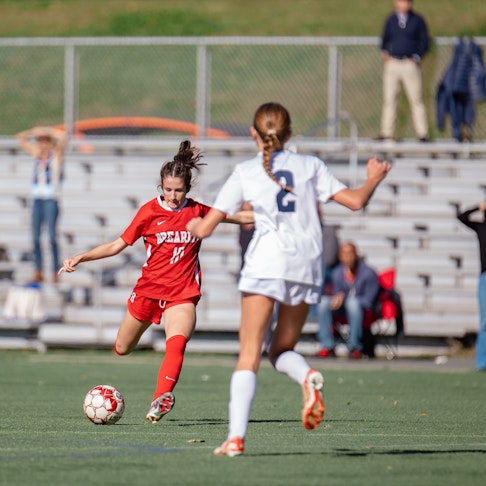
Athletics
The Brearley Athletics Program offers students in Classes V–XII the opportunity to participate in a competitive athletic environment.
Learn more about athletics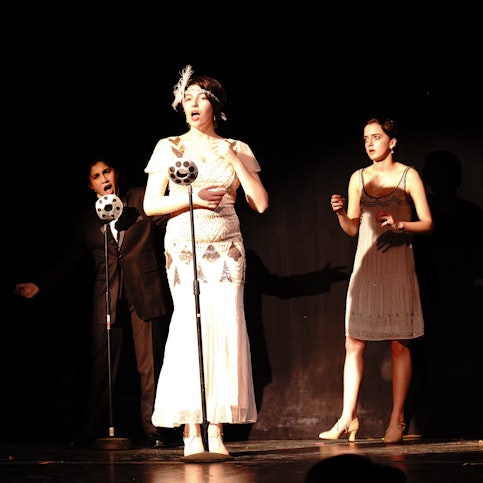
Arts
The visual and performing arts play an integral role in the curriculum and life of Brearley students.
DanceDramaMusicVisual Arts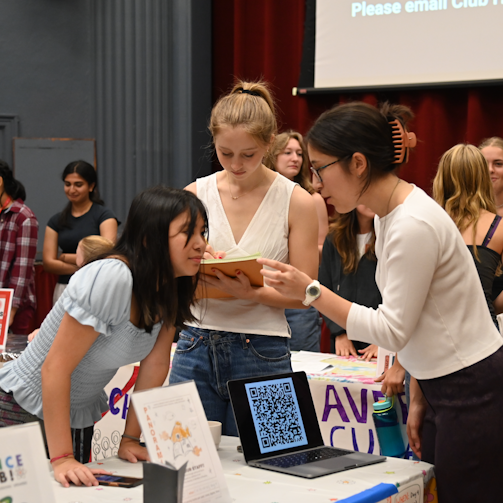
Clubs and Activities
Upper School students have numerous opportunities to pursue their interests outside of the classroom.
Learn more about our clubs and activities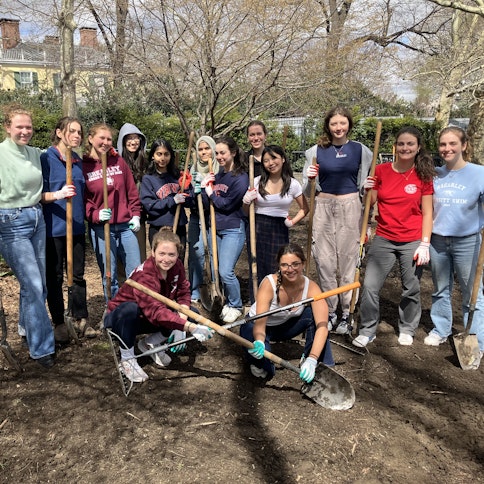
Service Learning
Brearley’s long-standing commitment to community service complements and supports our academic program.
See how we serve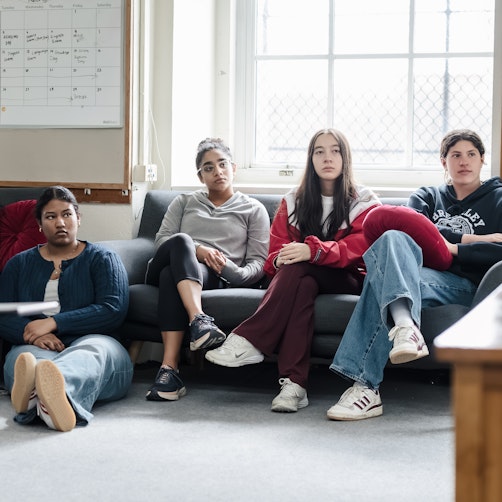
College Advising
The college search and application process is an opportunity for students to exercise their decision-making skills and independence.
Learn more about our college advising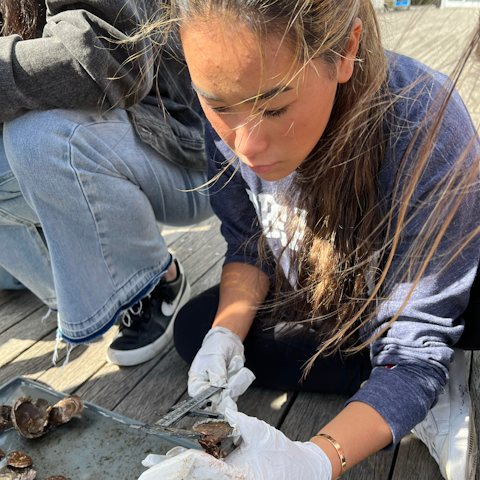
Off-Campus Learning
Upper School students have many opportunities to pursue their interests beyond the regular curriculum, with a wide range of programs and exchanges.
Explore off-campus learning